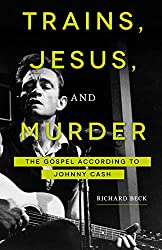For our (virtual) Epiphany study this year, we will be reading through the book Trains, Jesus, and Murder – The Gospel According to Johnny Cash. The author, Richard Beck, is the Chair of the Psychology Department at Abilene Christian University. (His blog is Experimental Theology.) The book grew out of a bible study he leads at a local maximum-security prison. He began listening to Cash (Live at Folsom Prison) to understand their mutual audience. He realized, like Jesus, Cash brings us into the presence of the marginalized and forgotten people of our society – the imprisoned, the heartbroken, the beaten down, Native Americans, common laborers, drug addicts, and those who have never felt the love of Jesus. For the men that Cash sang to and about, or the men that Beck leads in bible study, sin and its consequences, and the promise of one day being free are not theoretical ideas to be discussed, but an ever-present reality that is lived. An interview with Beck about his book is HERE.
As Beck describes his book: “The gospel according to the Man in Black is a gospel rooted in solidarity. The cross of Christ, in this view, is an act of divine identification with the oppressed. On the cross, God is found with and among the victims of the world. More, given that crucified persons were considered to be cursed by God – ‘Cursed is anyone who is hung upon a tree’ (Deut. 21:23) – God is found in Jesus among the cursed and godforsaken. Again, the first place to look for Jesus is in hell. By standing with the poor and the downtrodden, the music of Johnny Cash shows us how a gospel of solidarity begins as an interpretive activity: the cross is a way of seeing and reading the world. Specifically, the cross helps us answer this most important question: Where is God?”
Flanner O’Connor (another great Southern Christian artist) said that her literary project consisted of describing “the action of grace in territory largely controlled by the devil.” It is the same with Johnny Cash and his songs. I hope that you can join us for this virtual study this year.


Thank you, Charlie. Your work is “equipping the saints for the work of ministry.”